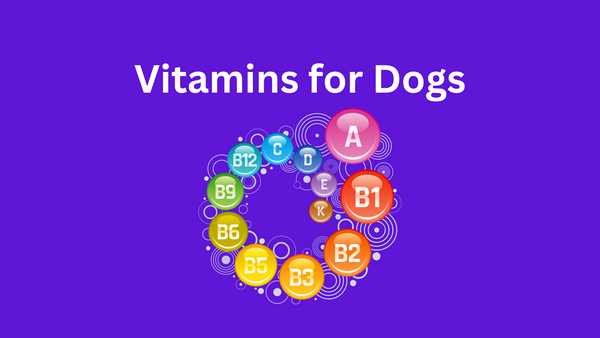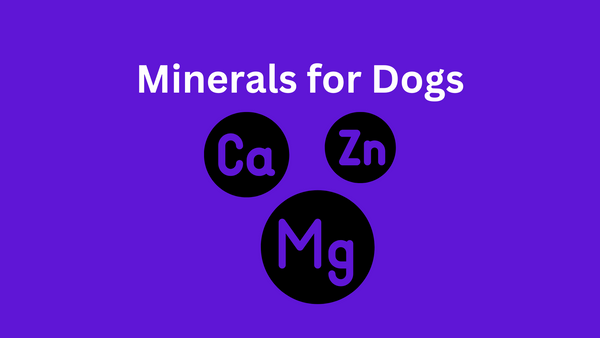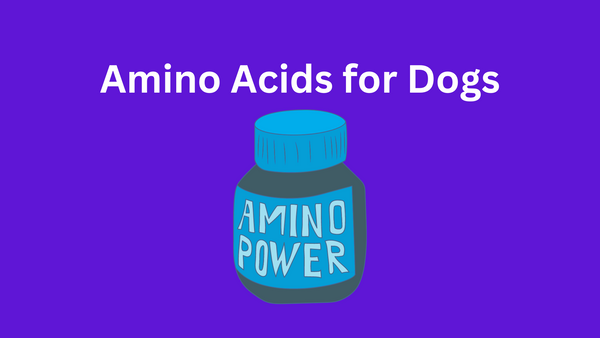Learn About Your Dog's Nutrition
Learn about your dog's nutrition here.
From vitamins & minerals to herbs for dogs, Xen Pets complete list of nutrients can educate both beginners and experts.
Vitamins for Dogs

Biotin
Biotin (vitamin B7) has many uses. Just like humans, dogs need biotin as part of a healthy diet. Biotin deficiency in dogs can lead to hair loss, dry flaky skin, and rashes. Eggs, bananas, and milk all contain biotin.
Benefits
- Promotes hair & nail cell growth
Vitamin A
Vitamin A is essential for providing a range of critical benefits to your dog: from boosting immunity and improving vision, to helping with growth and tissue maintenance.
Benefits
- Eyesight Support
- Bone Growth
Vitamin B
B Vitamins are a group of essential nutrients that play a crucial role in a dog's overall health and well-being. These vitamins are water soluble compounds, unlike the fat soluble vitamins A, D, E, and K.
Benefits
- Supports Metabolism Health
- Promotes Skin & Coat Health
Vitamin C
Vitamin C, also known as ascorbic acid, is a crucial nutrient for dogs that can help keep their immune system healthy and their bones strong.
Benefits
- Immune Support
- Repairs Body Tissue
Vitamin D
Vitamin D, also known as the sunshine vitamin, has long been recognized as a vital component in maintaining bone health. This fat-soluble vitamin has the ability to regulate calcium and phosphorus levels in the body, which is crucial for overall health.
Benefits
- Bone Growth & Repair
- Joint Repair
Vitamin E
One essential nutrient that dogs need to maintain a healthy lifestyle is vitamin E.
As an essential vitamin and powerful antioxidant, it helps to neutralize free radicals that could cause oxidative stress. This, in turn, promotes good health in different areas of their bodies.
Benefits
- Heart Support
- Promotes Skin & Coat Health
Vitamin K
Vitamin K is a fat-soluble vitamin that plays an important role in blood clotting. This crucial nutrient ensures that wounds heal properly by producing proteins that aid in blood coagulation.
Benefits
- Supports Wound Healing
Thiamine Mononitrate (Vitamin B1)
Thiamine, also known as vitamin B1, is great for dogs. Vitamin B1 is one of 8 essential B vitamins for dogs. This vitamin helps to convert carbs into energy and aids in nerve function.
While thiamine deficiencies are rare in dogs, supplementing could help to ease the health risks of a deficiency.
Benefits
- Energy
- Aids nerve function
Minerals for Dogs

Calcium
Calcium is an essential mineral found in bones, teeth, nerves, and muscles. It's necessary for the proper functioning of all these parts of the body.
For dogs, calcium is particularly important for the development and maintenance of strong bones and teeth.
Benefits
- Maintenance of Strong Bones and Teeth
Magnesium
Magnesium is an alkaline earth metal found in gray and shiny rocks. It's required for hundreds of vital metabolic functions and chemical reactions.
Benefits
- Protein Production
- Nervous System Support
Potassium
From aiding muscle function to balancing fluids, the importance of potassium in your pup's diet can't be overstated.
Benefits
- Safeguard Against Dehydration
- Maintains PH Balance in the Bloodstream
Iron
Iron is an essential mineral for the functioning of your dog's body. Iron powers your dog's circulatory system. Without iron, this system cannot function properly.
Benefits
- Supports circulatory system
- Helps to transport oxygen
Zinc
Zinc is an essential nutrient that provides a range of health benefits for dogs - from skin and coat health to building stronger immunity.
Benefits
- Immune Support
- Promotes Skin & Coat Health
Amino Acids for Dogs

L-Theanine
L-Theanine is an amino acid that is naturally occurring and can be found in black and green tea leaves and other natural resources.
Benefits
- Calming Effect
L-Tryptophan
L-Tryptophan is an essential amino acid that's necessary for many bodily functions. It's naturally found in red meat, poultry, eggs, and dairy products.
Benefits
- Quality Sleep
- Serotonin Production
Herbs for Dogs

Chamomile
Chamomile is a trusted and widely used soothing herb dating back centuries.
Chamomile is a dried flower from the Maricaria species, which is a member of the daisy family.
Benefits
- Anti-Inflammatory
- Calming Effect
Flaxseed
Flaxseed oil (also known as linseed oil) comes from the seed of the flax plant. It's made from cold pressing fresh and ripened seeds. This produces an oil with many health benefits.
Benefits
- Protects against heart disease and blood clots
Ginger
Ginger has been used to improve health throughout human history. There are many studies that show ginger's effects and benefits on humans.
Although not as much research has been conducted on dogs, some evidence shows that ginger can benefit your dog.
Benefits
- Anti-Inflammatory
- Aids Digestion
Green Tea
From improved digestion to lowered inflammation, green tea offers an array of health benefits for our dogs.
With its antioxidant-rich properties, green tea can help strengthen the immune system, support overall well-being, and even aid in weight management.
Benefits
- Antioxidant
- Heart Support
Passionflower
Passionflower is a climbing vine found in the Southeastern United States and Central and South America.
As early as the 16th century, people have used passionflower for its calming properties.
Benefits
- Calming Effect
- Quality Sleep
Rooibos Tea
Rooibos tea has long been appreciated for its health benefits in humans and now many dog owners are discovering the amazing natural healing effects this red bush herb can have on their dogs.
Benefits
- Anti-Inflammatory
- Soothes Skin Irritations
Valerian Root
Valerian root can have a calming effect on both humans and our furry friends. It's a safe and effective herb and can have great benefits for your dog.
Valerian root supplements can be found in powders, oils, capsules, and dog treats. This calming herb continues to grow in popularity for dog owners everywhere.
Benefits
- Calming Effect
Spices for Dogs

Cinnamon
Many foods, treats, and desserts across the United States contain cinnamon. It's the second most consumed spice just after black pepper! But are dogs allowed to eat cinnamon? Yes, dogs can eat cinnamon.
But there are a few things to be aware of such as the type of cinnamon and how much cinnamon you give your dog.
Benefits
- Blood Sugar Support
- Supports Heart Health
Miscellaneous

Glucosamine
Glucosamine, sometimes referred to as glucosamine hydrochloride (HCL), is a naturally-occurring substance found in your dog's connective tissues.
Benefits
- Joint Health
- Cartilage Support
Melatonin
Melatonin is a naturally occurring hormone. It has the ability to help dogs in many ways, even helping with anxiety by promoting sleep.
Benefits
- Quality Sleep
Omega Fatty Acids
Omega 3 and Omega 6 are essential fatty acids for dogs that play a crucial role in maintaining their overall health.
These fatty acids are considered essential because dogs cannot produce them on their own, and therefore need to be obtained through their diet.
Benefits
- Promotes Skin & Coat Health
- Joint Health
